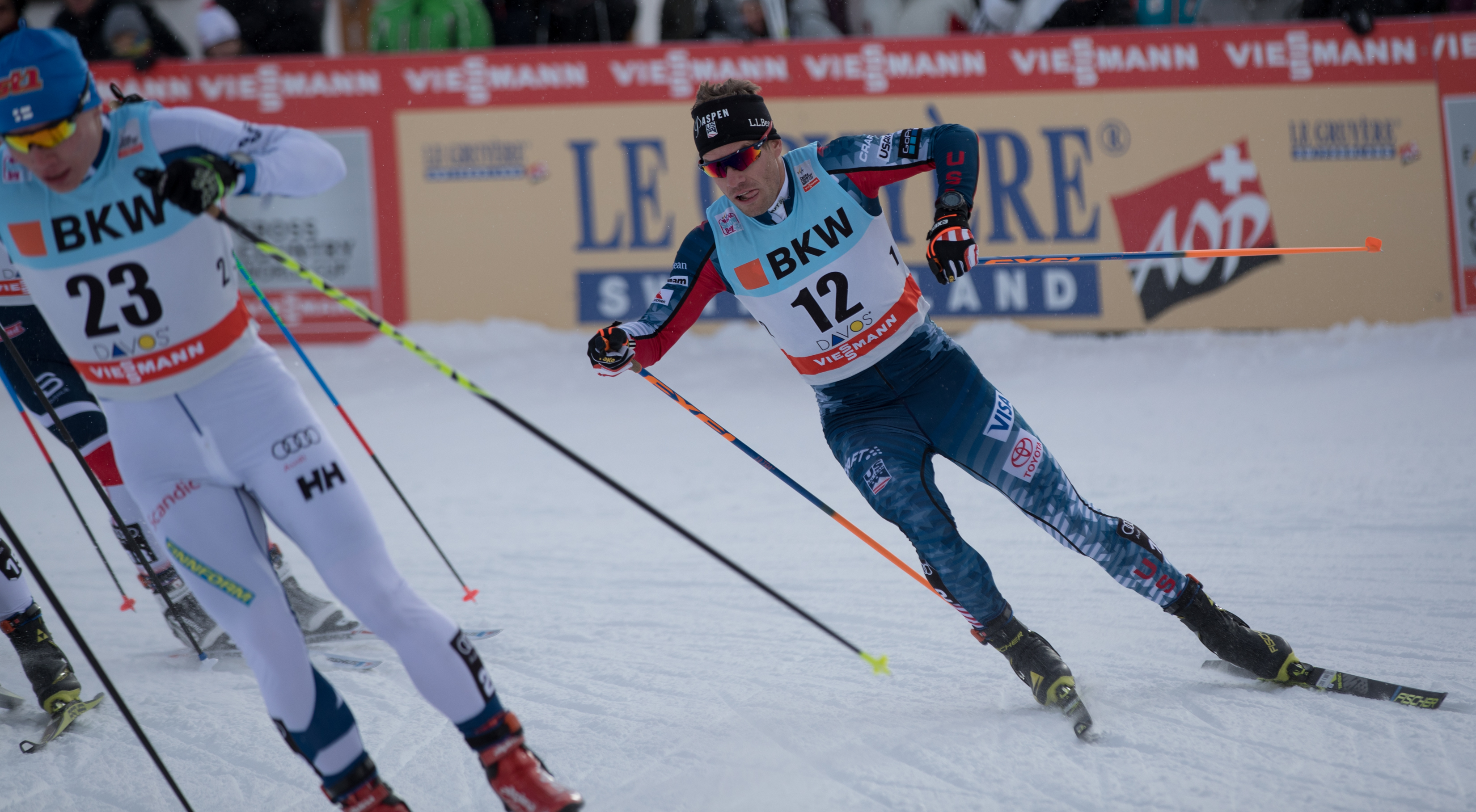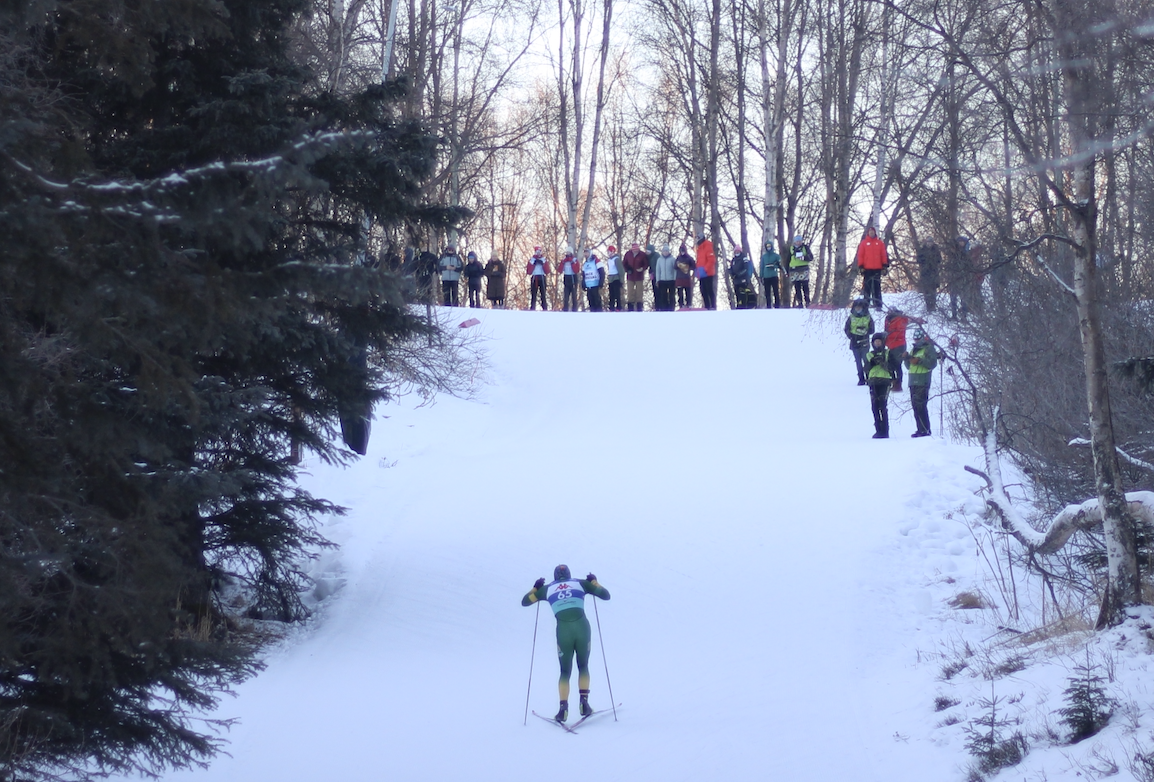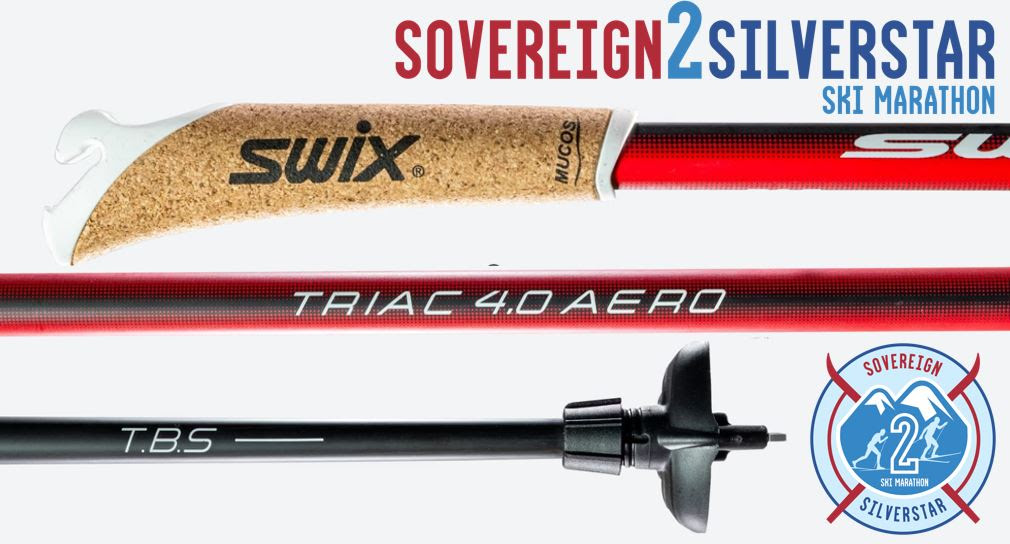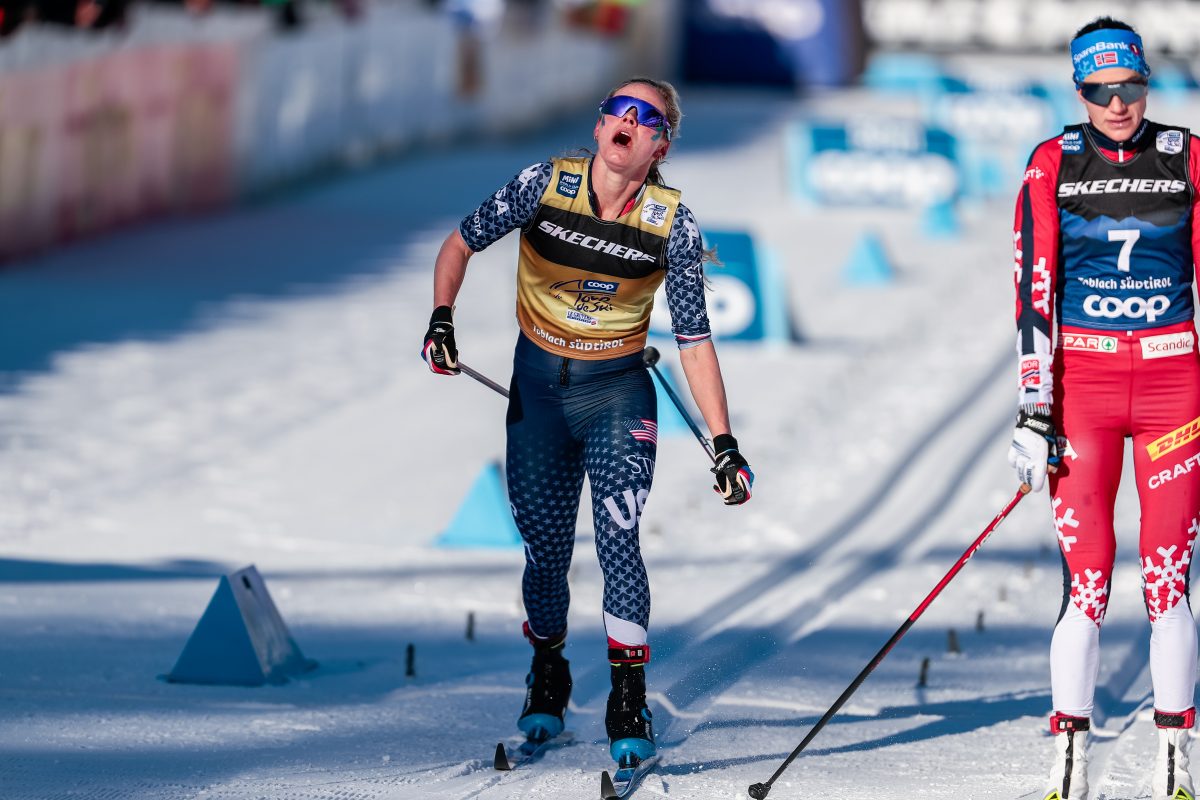
DAVOS, Switzerland – Would Johannes Høsflot Klæbo cruise to win No. 6, a perfect World Cup record, in the skate sprint today, or could someone stop him?
As qualifying finished, the quarterfinals passed, and the semifinals began on Saturday, it became clear that only one man had a chance: Federico Pellegrino, the Italian who won World Championships gold over Klæbo last season.
Sergey Ustiugov, the Russian who would have challenged Klæbo last year, didn’t make the final. Neither did any of Klæbo’s Norwegian teammates. Sweden’s Teodor Peterson fell in his quarterfinal, Calle Halfvarsson was out sick this weekend and Emil Jönsson, the Swedish hero of old, didn’t make the heats.
It was all down to Pellegrino, but in the final when Klæbo pulled away on the long straightaway through the stadium, the Italian’s most valliant efforts couldn’t quite keep pace.
The young Norwegian instead claimed yet another win, and Pellegrino – charging in the finishing lanes as Klæbo slowed up and crossing the line just 1.80 seconds later – was second.

“I felt strong in the finals, and I got the luck I needed,” Klæbo told Norway’s NRK broadcaster. “In the prologue it was heavy, and I felt really stiff. But it’s nice to say that it was good at an altitude like this.”
Indeed, Klæbo had worried that this race wouldn’t be like the five previous ones this year. Unlike some of his competitors, he rarely spends time at altitude. At 1,500 meters above sea level, Davos is one of the highest venues on the World Cup.
“I have been to Sognefjellet some years in the summer, and that is 1,400 meters,” the 21 year old told NRK. “That’s high enough for a boy like me. And that’s my experience.”
Meanwhile, Pellegrino, 27, returned to the podium for the first time this season after finishing fifth in the classic sprint in Kuusamo, Finland, and 19th in the classic sprint in Lillehammer, Norway.
“It’s always good to be on the podium,” Pellegrino told FIS. “Johannes is in a great shape this year and it is very hard to beat him. Davos sprint is kind of my competition so for sure I wanted to win here. But I cannot be unhappy with second.”
Russia’s Alexander Bolshunov notched his third podium of the season in third place, 4.64 behind Klæbo. He now ranks second in the overall World Cup, just behind Klæbo. Both men are still in the under-23 age category, signaling a potential changing of the guard on the World Cup.
“In the final, the pace in the first lap was not that high,” Bolshunov, 20, told FIS. “In the second lap, Johannes and Federico were pushing hard. I wanted to stay close to the leading group. When they broke away I did my best to finish in third place.”
Finland’s Ristomatti Hakola finished fourth (+5.39), France’s Richard Jouve fifth (+8.65), and Russia’s Gleb Retivykh sixth (+18.34) in the final.
On Sunday, the World Cup will see a new winner as Klæbo is sitting out the 15 k freestyle interval start.
Hamilton Just Misses Final
After missing last weekend’s World Cups due to illness, the U.S. Ski Team’s Simi Hamilton qualified in 12th in Davos on Saturday and skated his way to the semifinal, after Sweden’s Peterson, who had been leading his quarterfinal, crashed coming into the final turn. Hamilton put in a little hop to get around Peterson’s skis and cruised to second behind France’s Renaud Jay in first.
In his semifinal, Hamilton couldn’t quite find room to make the right moves in a hectic heat. He finished fifth, 1.84 seconds behind Hakola who won that semifinal, and ended up ninth on the day.
“There is so much position changing between the first and second lap, and it definitely gets jammed up in places,” Hamilton said after. “But it’s what makes it super exciting every year. I actually felt really good the last few days training, but I really had no expectations on how I was going to do just bouncing back from a pretty nasty sickness last week. So I was excited to ski in the semifinals and end up top 10 today. I was definitely running on fumes in that semifinal, but I am psyched about everything coming up. I’m healthy again and that really helps.”
“Simi, you could see that he still doesn’t have full energy back from being ill, but the fitness is there,” U.S. Ski Team Head Coach Chris Grover said. “So when he gets a little bit more glycogen loaded onboard, he’s going to be good.”
Hamilton’s semifinal was a very fast heat; both “lucky losers” to the final came from his semifinal. Both Klæbo and Pellegrino had been in the first semifinal, and blew it wide open. The second semifinal was more competitive – all six of the racers matched Klæbo’s time from the other heat – so one spot or 0.44 seconds faster would have put Hamilton in the final six.
“When you get people like Klæbo skiing a heat, it tends to get a little more strung out,” Hamilton said. “I bet a lot of people though that both lucky losers would come out of the first semi, but I think sometimes its kind of opposite. The more homogeneous the heat is, it’s usually faster because you constantly getting people changing leads and drafting, and the momentum keeps getting pushed pushed pushed.”
Hamilton had thought he just might be able to slingshot into the top four in the heat, and thus into the final, but it didn’t happen.
“It’s kind of cool knowing that we skied a really fast heat,” he said. “I was a little bummed going into the 180-degree corner on the second lap — I felt like I still had decent position. I didn’t have a lot of energy left, but I thought, all right, if I can just get a really good draft on the downhill and stay smooth in the finish, there’s a good chance I could get third or fourth. But Jouve kind of cut in a little bit on the left and just pinched me. There is always going to be scrappy skiing, so that is what makes it fun.”
Harvey, Newell Out in Quarterfinals
Both Andy Newell of the U.S. and Alex Harvey of Canada made the quarterfinals but failed to advance, finishing 21st and 23rd, respectively, at the end of the day. Both finished fifth in their respective heats: Newell finished 2.44 seconds behind Klæbo, who won his quarterfinal, and Harvey was 1.14 seconds behind his quarterfinal’s winner, Retivykh.

“I felt good in qualification, felt good in the heat, too,” Newell said. “I was really wanting to go on the inside on that last corner like Pellegrino, but [Jovian Hediger] fell in front of me, so it was kind of a bummer, but I was feeling pretty good. It wasn’t a great result but … I think without getting pushed so wide on that last corner I could have had a better finish. So yeah, next week.”
Harvey ended up being in the fastest quarterfinal, but he couldn’t manage to get one of the lucky loser spots, instead finishing just outside in fifth in his heat.
While Newell said he wasn’t able to take the line he wanted, Harvey said he simply chose wrong, and that was probably the difference between making the semifinals and not.
“In the finish I should have gone left of Jouve,” Harvey said. “I was on his left — I kind of slowed down and went on the inside, and that gave [Norway’s] Emil [Iversen] the slingshot, so looking back that was a mistake, because I knew it was a fast heat. We were going fast the whole way, so I knew that top three or even four had a good chance of being lucky losers. I should have carried my speed and then I would have blocked the lane for Emil, but I am happy. It is a really short sprint and my speed is coming up now, so it’s good moving forward.”

The Davos course is not one that has always showed Harvey a lot of love in the past, so that was another reason to be happy with 23rd place.
“I haven’t qualified here in four or five years so, yeah, I was really happy with the qualifier,” he said. “It was still a good day – two and a half minutes is too short for me. I need three and a half. And altitude is always hard — I have never been top 10 in a distance race here, so I am not expecting too much tomorrow. I always struggle at altitude but I will still go do the best I can.”
Also for Canada, Julien Locke came close to qualifying, finishing 36th and just 1.07 seconds out of the top 30. Russell Kennedy finished 48th (+9.39 out of first), Knute Johnsgaard 52nd (+10.35), Jesse Cockney 54th (+10.83), and Devon Kershaw 63rd (+11.78).
Also for the U.S., Erik Bjornsen finished 58th in qualifying (+11.12) and Patrick Caldwell was 108th (+24.04) after crashing on a sharp corner.
Results: Men’s final | Men’s qualifier
Chelsea Little
Chelsea Little is FasterSkier's Editor-At-Large. A former racer at Ford Sayre, Dartmouth College and the Craftsbury Green Racing Project, she is a PhD candidate in aquatic ecology in the @Altermatt_lab at Eawag, the Swiss Federal Institute of Aquatic Science and Technology in Zurich, Switzerland. You can follow her on twitter @ChelskiLittle.



